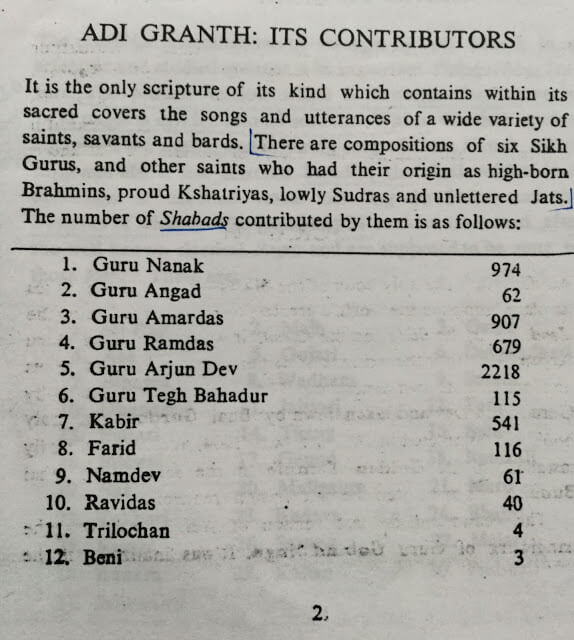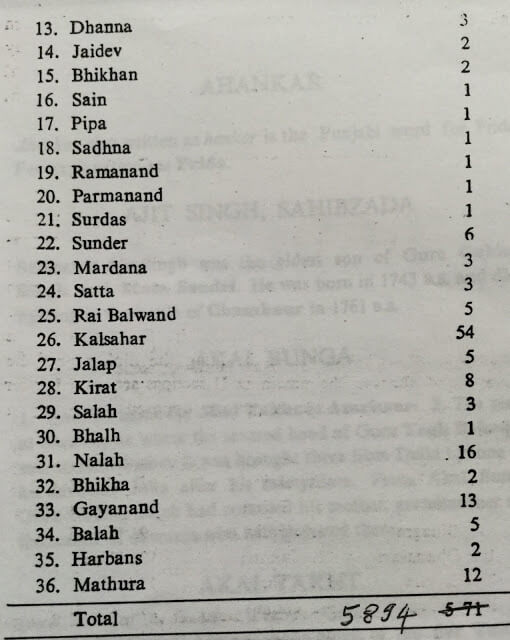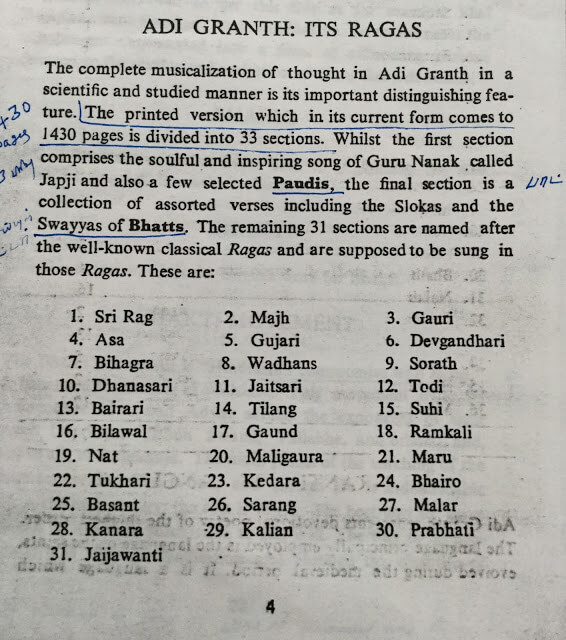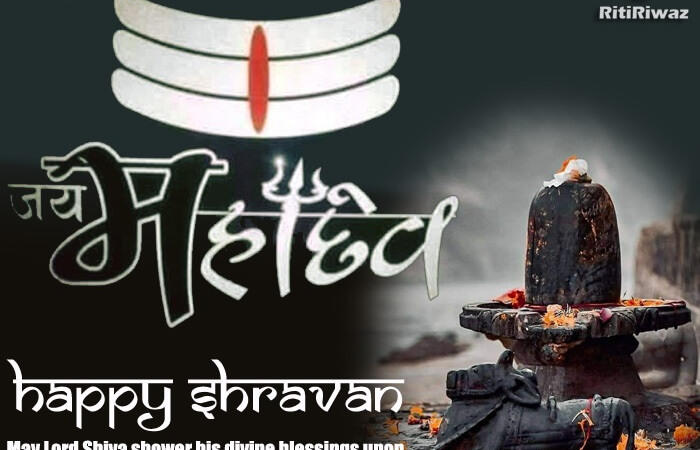The Last Guru – Guru Granth Sahib
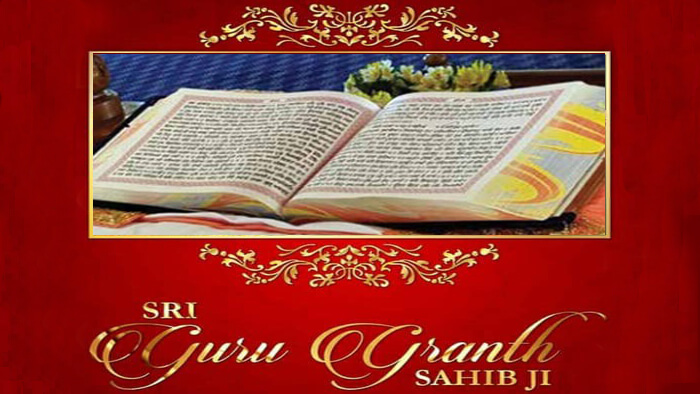
The Guru Granth Sahib, also called Adi Granth, is the holy book of the religion Sikhism. It is a collection of hymns of the first five Sikh gurus and the Ninth Guru and various other saints. These hymns are sung during worship services held at the gurudwara. This collection of hymns are very simple things like remembering god, don’t lie, be good to each other, be truthful, think of God in every breath, just focus on doing the right thing.
Sikh follow the teaching of gurus. Guru is a name that is often used in India for religious teachers. Sikh believe there were ten human Gurus who were special. they gave God’s teaching to ordinary people. The first Guru of the Sikh is Guru Nanak while the tenth Guru was Guru Gobind Singh, after whom instead of Sikh’s teacher there was the holy book Guru Granth Sahib. Granth means a large book and Sahib is the title that shows respect. First Guru Nanak penned 974 hymns, Second Guru Angad (62), Third Guru Amar Das (907), Fourth Guru Ram Das (679), Fifth Guru Arjan (2218), Ninth Guru Teg Bahadur (115), and the remaining 937 hymns come from thirty Hindu-Muslim saints and sages.
The Adi Granth begins with the following hymn composed by Guru Nanak and known as “Mool Mantar“.
There is One God (ੴl EkOnakar), it reminds the oneness of God and the oneness of humanity (the belief that everyone is equal).
The Guru Granth Sahib is the central scripture of Sikhs and is enthroned as the current living guru for the community. It is at the heart of Sikh worship and lends sacredness to the gurdwara or temple. Sikhs bow before the Guru Granth Sahib and pray in its presence. It has undergone developmental changes since the time of Guru Nanak but received its distinctive form under the fifth Guru, Arjan.
In addition to the teaching of several gurus, it also contains Hindu and Muslim hymns and is written in rhyming couplets. It was composed in Sanskrit, Persian, Hindi, and Punjabi. It is printed in “Gurmukhi” script, which is an alphabet adapted for the Punjabi language. The Guru Granth Sahib now consists of 1,430 standardized pages. Also an important text, and published in 1945, the “Rehat Maryada” (or Sikh Code of Conduct) regulates individual and corporate Sikh life.
The hymns are called Shabads and are a source of guidance and inspiration for the Sikhs in their lives. These words of hymnic praise are understood to be the Divine Word, the very form of both the guru and the one, formless God. In Guru Granth Sahib there are about 3,000 hymns that are written in Punjabi and Hindi language, the language of common people.
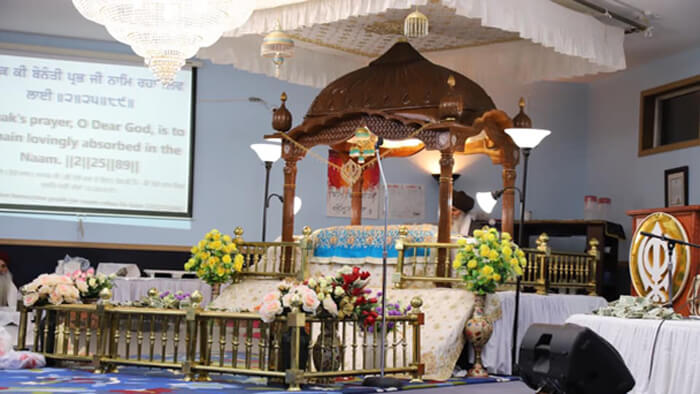
The Guru Granth Sahib is set on a raised platform in the gurudwara covered with a royal canopy. The book itself is covered with bright cloth, often fringed with silver or gold. When the book is open it is fanned with a white yak-tail fly whisk. All people visiting gurudwara kneel or bow fully in front of the lectern bearing the Guru Granth Sahib.
It is a collection of varied divine thoughts, it is no wonder that the Granth Sahib teaches believers to love all creation since it is God’s own manifestation. The basic focus of all 10 Gurus and that of Guru Granth Sahib is to do with four types of unity — unity of God, unity of mankind, unity of religion, and unity of classes. As a matter of principle — Sikhs offer the same reverence to The Granth Sahib as they do to the 10 Gurus of flesh and blood. The 30 Hindu and Muslim saints whose compositions appear in the holy book also get the same respect and devotion as when Sikhs bow to the Granth Sahib or when the hymns are sung out of the holy book at the Golden Temple in Amritsar and all the local Gurdwaras throughout the world.
The original volume was of Adi Granth was written by Bhai Gurdas, under the direct supervision of Guru Arjan. It took five years to complete it and was installed in Harmandir Sahib (“the abode of God”), popularly known as the Golden Temple, on September 1, 1604, with Baba Buddha as the first Granthi. This original volume is presently in Kartarpur and bears the signature of the Guru Arjan.
Important Milestones
Guru Gobind Singh — the tenth Sikh Guru, raised the Adi Granth to the status of a permanent Guru and conferred it the title of “Guru of the Sikhs” in 1708. He said “Sab Sikhan ko hukam hai Guru Manyo Granth”. Prakash ceremony is the installation of Sri Guru Granth Sahib upon the Palki Sahib for the day, or for the Gurdwara ceremony about to be conducted. The first ‘Parkash’ of the holy book was started by the fifth Sikh Guru Arjan Dev on September 1st, 1604.
• 30 August 1604: Completion of Adi Granth
• 1 September 1604: Adi Granth installed for the first time at Harimander Sahib by Guru Arjan Dev Ji
• 1705: The Damdama Sahib Bir was completed by Guru Gobind Singh Ji from memory.
• 20 October 1708: Installation of the Guru Granth Sahib Ji as eternal Guru
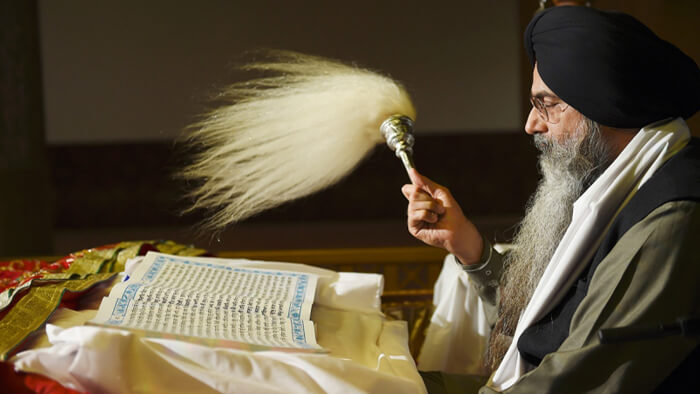
There are special care and protocol to be observed by a person in presence of Adi Granth
- One’s head must be covered at all times.
- One’s shoes must be removed outside the Guru’s room.
- Basic standards of personal hygiene are to be observed.
- Eating or drinking while in service is strictly avoided.
- A respectful attitude towards others who are present must be held.
Anyone who wishes to take responsibility for the care and handling of the Siri Guru Granth Sahib should bathe, wash their hair, and dress in clean clothing. No tobacco or alcohol may be on their person. Before touching or moving the Guru Granth, the attending person must cover their head, remove their shoes, and wash their hands and feet. The attendant should stand facing the Guru Granth with their palms pressed together. The formal prayer of Ardas must be recited. The attendant must take care that the Guru Granth never touches the ground.
Siri Guru Granth Sahib is to be maintained in an environment that is in keeping with the Sikh code of conduct. Edicts prohibit transporting the Guru Granth to any place which is not used strictly for worship purposes. Any place habitually used for parties, dancing, serving of meat or alcohol, and where smoking takes place, is off-limits for any type of Sikh ceremony.
Adi Granth and its contributors
